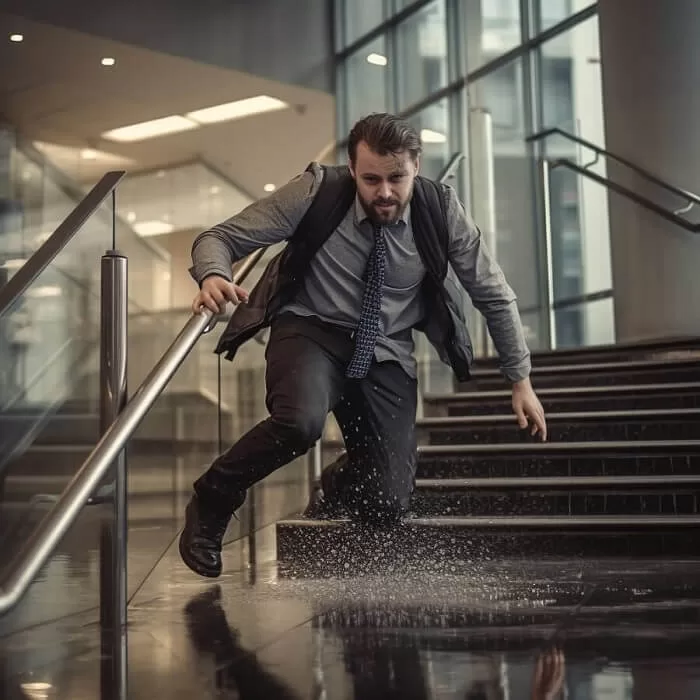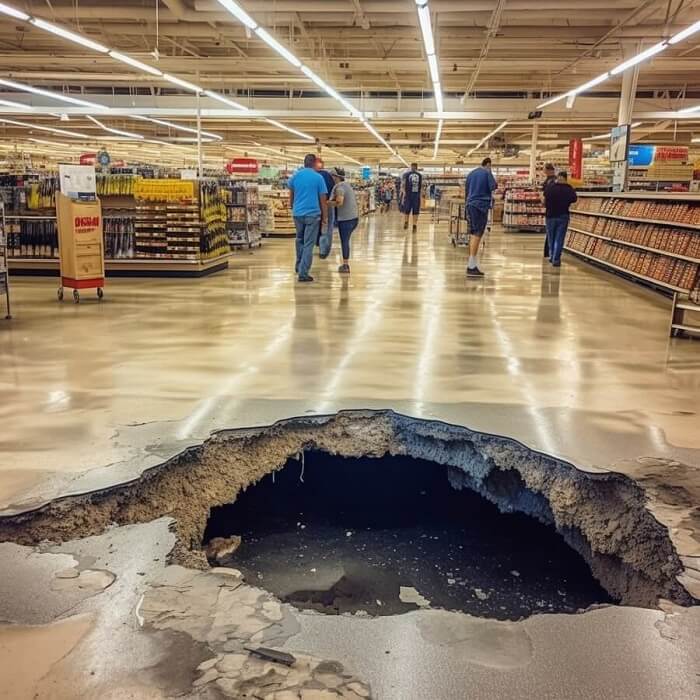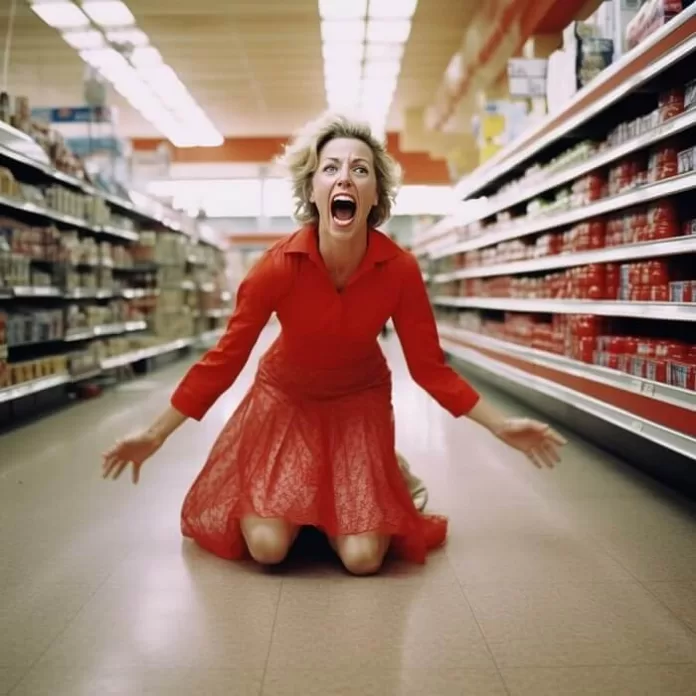Understanding Slip and Fall Accidents
We’ve all had that moment where our feet slip out from under us. It’s embarrassing, and usually, it ends with nothing more than a bruised ego. However, what if that slip or trip causes serious injuries? Then it’s no laughing matter. Experienced attorneys handle many slip and fall cases each year in slip and fall law.
Now, let’s imagine you’ve been injured in a slip. Maybe you slipped and fell on someone else’s property. You’re hurt and facing medical bills, time off work, and a recovery process that’s anything but quick or easy.
You may be considering contacting a slip and fall lawyer, wondering if you have a valid slip and fall accident case. It’s here that things get complicated, and that’s where this article comes in. Let’s unravel the complex web that is slip and fall law.
The Premise Liability Principle
At the heart of every slip and fall lawsuit lies the concept of premises liability. In simple terms, premises liability laws state that property owners have a duty to keep their property safe and hazard-free.
They are obliged to show what the law calls ‘reasonable care’ to ensure no one gets injured. Whether the property owner followed this duty or not often becomes the focal point of the slip and fall case.
The crux of premises liability is determining whether the owner failed to maintain a safe environment that led to the accident. Did they know about the dangerous condition that caused your fall? Did they take measures to fix it or at least warn visitors about it?
Answers to these questions can help you understand whether the owner may be liable for a slip and fall incident.

The Role of the Property Owner in Slip and Fall Law
The liability of a property owner in a slip and fall accident case is not as straightforward as it might seem. One of the key factors in determining liability is to establish whether the property owner was negligent.
- Was there a spill on a supermarket floor that they neglected to clean up?
- Were there icy conditions on their driveway they didn’t address?
If the answer to questions like these is ‘yes,’ they could be held liable.
Negligence and the Property Owner
Negligence, in the context of a slip and fall case, is about the failure to exercise the necessary care to keep a property safe. It involves a situation where the property owner knew or should have known about a dangerous condition on their property, but failed to rectify it. This failure could cause someone to slip and fall, resulting in injuries.
However, proving negligence isn’t always easy. Your slip and fall lawyer will need to demonstrate that the property owner knew about the hazard, that they had an opportunity to correct it. That they didn’t take the necessary steps.
If you fell on someone else’s property due to a dangerous condition that was not obvious to you but should have been to the owner, they may be at fault for the slip.
Navigating a Slip and Fall Claim
A successful slip and fall claim isn’t as simple as showing that you fell and got hurt. To recover compensation, you need to file a personal injury lawsuit within a specific period, known as the statute of limitations. The statute varies from state to state, but generally, it’s two years from the date of the accident to file a lawsuit.
The Role of the Plaintiff in a Slip and Fall Law
As the plaintiff, it’s your responsibility to show that the property owner failed in their duty to keep their property safe. To build a robust case, your slip and fall attorney will need evidence.
Photographs or videos of the scene of the accident, medical records documenting your injuries, witness testimonies. Even weather reports (in cases of snow and ice causing a fall) can all be vital pieces of evidence.
It’s essential to note that you, as the injured party, also have a role in maintaining your safety. This concept is known as contributory negligence. If you ignored clear warning signs or were distracted while walking, your compensation might be reduced based on your percentage of fault.

When to Contact a Slip and Fall Law Firm
Should you find yourself a slip and fall victim, it can be overwhelming to navigate the legal process alone. An experienced attorney can handle slip and fall accident claims effectively, helping injured people like you get the compensation they deserve.
How a Slip and Fall Lawyer Can Help
A slip and fall lawyer, also known as an accident attorney, can be an invaluable asset when you’ve suffered injuries in a slip. These accidents usually happen unexpectedly, causing confusion and stress. When you’re in such a state, you might overlook crucial details, thus weakening your case.
Firstly, these attorneys can help you understand the causes of slip and fall accidents. They have vast experience and can easily identify whether a property owner’s negligence led to your fall. For instance, if a supermarket failed to place a “wet floor” sign after mopping, causing someone to fall. Then the lawyer would point out this oversight as a significant factor in your case.
Secondly, a lawyer helps in gathering the necessary evidence. This may include photos of the accident scene, witness statements, and medical records. These details can make or break your case when it comes time for the fall accident to file with the court. Without a lawyer, you may find this process overwhelming and potentially miss out on vital evidence.
Moreover, slip and fall attorneys understand the concept known as premises liability, which is at the heart of these types of cases. They can guide you through the intricate laws governing property owner responsibilities. They can determine whether a property owner was at fault for a slip, even in cases where you may partially share the blame.
Lastly, you should contact a lawyer promptly after your accident. In doing so, you ensure that your legal rights are protected and that you have the best chance at a favorable outcome. The lawyer will take over the legal proceedings, allowing you to focus on recovery while they fight for the compensation you deserve.
An accident attorney can guide you through the complex process following a slip and fall accident. From understanding the premises’ liability law to gathering evidence, determining fault, and finally filing your claim. Their expertise and guidance can prove vital to your case.
Questions and Answers about Slip and Fall Law
-
- What should I do if I get injured in a slip and fall accident?Firstly, seek immediate medical attention for your slip and fall injuries. Then, document the incident, preferably with photos of the site. If there were witnesses, ask them for their contact information.
Lastly, contact a personal injury lawyer to discuss your case. An experienced attorney will guide you on the next steps, such as filing an injury claim and seeking a fair settlement.
- How long do I have to file a lawsuit after a slip and fall accident?Generally, the law requires you to file a fall accident lawsuit within two years of the date of the accident. However, this timeframe, known as the statute of limitations, might vary depending on your state Slip and Fall Law. It’s best to consult with an injury lawyer to ensure you meet this deadline.
- Can I file a claim if I slipped and fell in a public place?Yes, the majority of slip and fall accidents occur in public places. You may file a lawsuit against the property owner or manager if they fail to maintain a safe environment.
The law requires property owners to exercise reasonable care to prevent accidents. If you slipped on a wet floor, for example, and the owner was aware but did nothing, they could be responsible for your injuries.
- Can I still recover compensation if I was partially at fault for my slip and fall accident?Yes, but your compensation might be reduced based on your percentage of fault. This principle is known as contributory negligence. If you were involved in a slip and fall accident, and you’re found to be 20% at fault, your potential settlement would be reduced by that percentage.
Again, a personal injury attorney can discuss your case and help you understand this concept better. - What kind of compensation can I expect from a slip and fall lawsuit?The compensation in personal injury cases, including slip and fall accidents, varies depending on many factors. These include the severity of your injuries, medical expenses, loss of income, and even emotional distress.
Generally, people usually fall into one of two categories in slip and fall cases: those with minor injuries and those with more serious injuries. Each type of slip and fall case will have different potential compensation. An experienced fall lawyer today can help you calculate a reasonable settlement expectation for your specific situation.
- What Should I Do If I Am Hurt in a Slip and Fall Accident?If you’re hurt in a slip, seek immediate medical attention, even if you believe your injuries are minor. Document the accident scene, note the condition that led to your fall, and collect contact information from witnesses. Notify the property owner or manager about the incident.
- How Often Do Slip and Fall Accidents Usually Happen?Slip and fall accidents are more common than you may think. They usually occur due to hazardous conditions such as wet floors, icy paths, poor lighting, or uneven surfaces. Thousands of individuals suffer injuries from these accidents every year.
- How Will a Lawyer Handle My Case?A lawyer will handle your case by first conducting a thorough investigation into your accident. They’ll gather evidence, identify the responsible parties, and work to prove their negligence. They’ll also negotiate with the other party’s insurance company on your behalf to reach a fair settlement.
- Who Are the Responsible Parties in a Slip and Fall Case?The responsible parties in a slip and fall case can vary based on the circumstances. It can be the property owner, a tenant, or a maintenance company. In some cases, multiple parties may share responsibility.
- How Will My Lawyer Identify the Responsible Parties?Your lawyer will identify the responsible parties by examining the accident scene, reviewing any surveillance footage, and looking into the property’s maintenance history.
And analyzing all related documentation, such as accident reports or eyewitness statements. Their thorough investigation will pinpoint those liable for your slip and fall accident.
- What should I do if I get injured in a slip and fall accident?Firstly, seek immediate medical attention for your slip and fall injuries. Then, document the incident, preferably with photos of the site. If there were witnesses, ask them for their contact information.
Note: The article provided here is for informational purposes only and should not be considered as legal advice. Consult a maritime injury attorney for legal assistance. They can evaluate your situation and provide guidance based on applicable laws and regulations.



